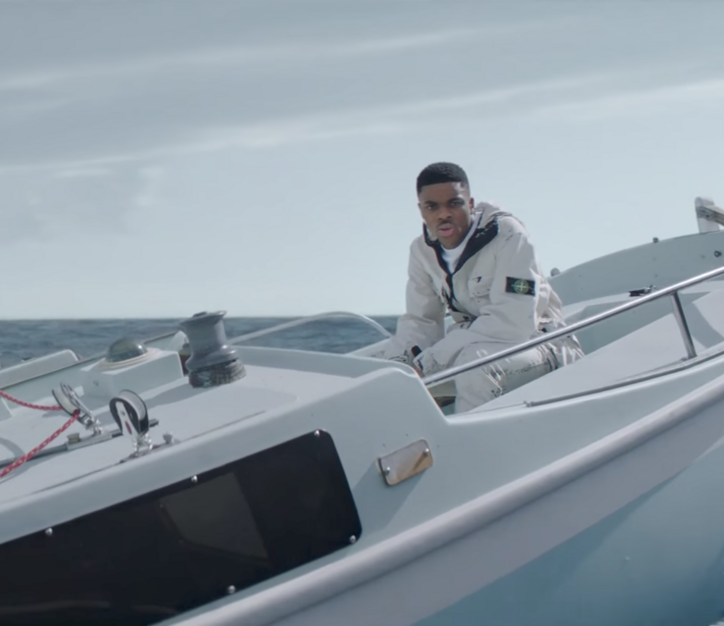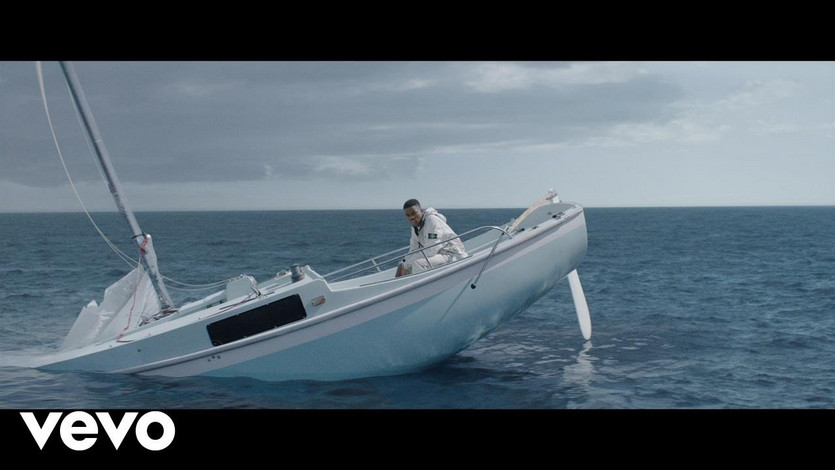AMAARAE wears JACKET by OTTOLINGER, BODYSUIT by ORIENS, SHORTS by I.AM.GIA, SHOES by FANCI CLUB, GLOVES by CARHARTT
Stay informed on our latest news!
Stay informed on our latest news!
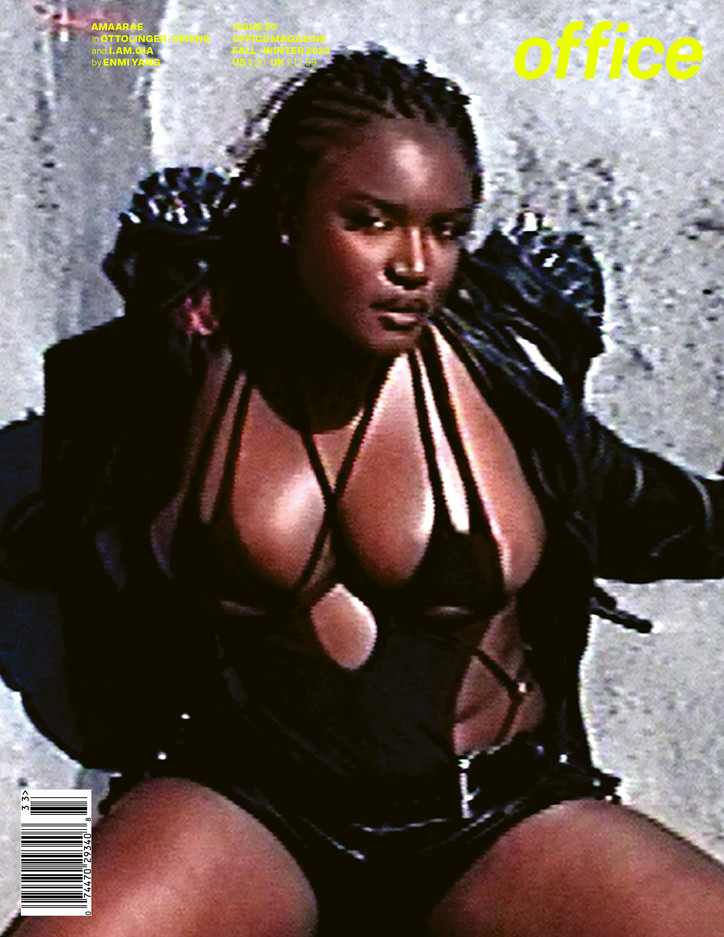
AMAARAE wears JACKET by OTTOLINGER, BODYSUIT by ORIENS, SHORTS by I.AM.GIA, SHOES by FANCI CLUB, GLOVES by CARHARTT
Preparation for our conversation began with endless plays, examining the intricate realms in which her music lives: genre-defying songs layered with the experimental production that Amaarae prides herself on. A producer first and foremost, the Ghanaian-American artist understands that singing is simply a welcome embellishment on her first love — sound engineering and intentional production.
In an industry that continues to put artists in a box, Amaarae is not so easily confined. Her unmatched pen, interdisciplinary perspective, and distinctively complex production have built her into a superstar whose creativity takes continually evolving forms. Midway through a triumphant year, Amaarae sat down with us via Zoom — her dog Dior popping in and out of frame — to discuss her creative process, musical influences, astrology, and love for Janet Jackson.
[Originally published in office magazine Issue 20, Fall-Winter 2023. Order your copy here.]
The last few months have been crazy for you. How are you?
Exhausted. Yeah, exhausted, but honestly grateful to be able to do what I do. Also, partially, I'm a little bit nervous about the record and how people are gonna respond to it.
How is Fountain Baby different from your debut album, The Angel You Don’t Know?
It's definitely more cinematic. The approaches to production and songwriting are, I wouldn't say better, but more expansive, and also more intentional. I grew a lot as a vocalist on this album and did more with my voice, and understood the subtlety of even how to use one's voice. Ever since I wanted to make music, this is the level that I've wanted to get to as far as having an idea in my head, and knowing exactly how to execute it. I did a lot of learning this time around.
And you executive produced this whole project?
Yes, sir! A&R’d and executive produced. I’ve executive produced all my albums, along with two of my other execs, KZ and Cube. So this is probably the third project I’ve produced.
That’s amazing! You released your debut EP in 2017, Passionfruit Summers, which introduced your production abilities but also your recognizable voice. What was the journey to finding your sonic style?
It happened a lot during my first EP of understanding what I wanted to communicate, which was sensitivity and vulnerability. I could do that by using my voice in this kind of high-pitched way. But what the development has been, and what the journey has been, is learning the parameters and how to color with my voice. How to make something sound sad, versus something that sounds excited, versus something that has a lot of attitude, versus something that sounds very controlled and subdued. My first project was knowing how I wanted to use my voice, and now it's knowing exactly how to use my voice, which is where I'm at right now.
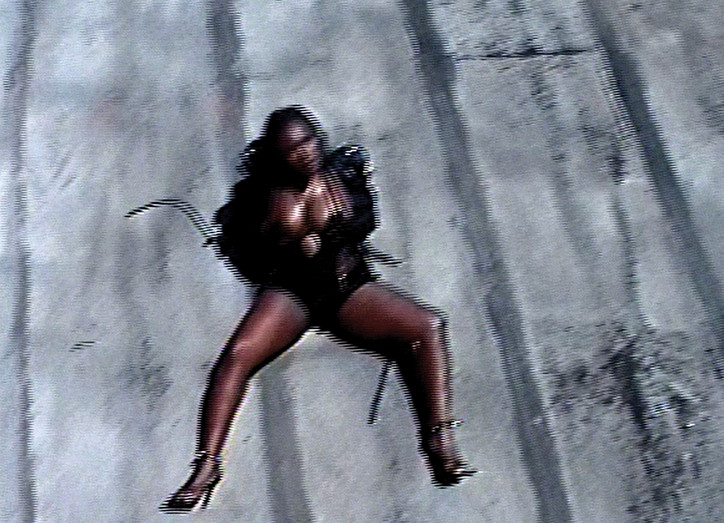
AMAARAE wears JACKET by OTTOLINGER, BODYSUIT by ORIENS, SHORTS by I.AM.GIA, SHOES by FANCI CLUB, GLOVES by CARHARTT
Now there are more eyes on you with the exposure from social media, specifically TikTok, where you saw your first platinum record, “Sad Girlz Luv Money Remix,” featuring Kali Uchis and Moliy. What’s your relationship with social media? Do you like it, or do you just have to use it for promotion?
I like it for entertainment purposes. I love Twitter. I go on Twitter and see funny jokes and discourse on a range of topics. But as an artist, I grew up watching artists like Michael, Janet, and Britney. So many artists I knew then didn't have to be social media marketers. Their job was to be good at music, sit with people, and figure out how to make a great video for television. How do we do interviews? How do we do XYZ? That was it. It wasn't; you have to create a personality that you sell to people on socials.
I can't tell you the number of times people have said to me, “Yeah, you should just do off-the-cuff content,” and I'm like, “Fuck, no, with all due respect.” I'm an artist, so I care to curate my art. If you're gonna come to my page, I care that the videos you see are curated in a certain way and the outfits are curated in a certain way. I think it's a battle of finding the balance between what works for me and what my boundaries are as far as something completely out of context with what I want to communicate to the world.
TikTok has warped people's perception of what a musical artist is. There is this added pressure and influence on the artist’s career and overall musical output. How do you feel about TikTok’s presence in the industry and the ongoing expectations for artists?
It's interesting how people view TikTok when it comes to music. To me, TikTok has shown, time and again, its ability to shed light on great music and music that previously went under the radar. “Sad Girlz Luv Money” is a great example, because I think it's a great song and I never made that record for TikTok. I just loved making a record about girls wanting money. Or Miguel's “Sure Thing” had an explosive TikTok moment. I liked that song in 2010 and thought it was the best in the world; 15 years later, people are rediscovering it. It's going crazy on the pop charts.
I don't think anyone should set out with the intention to make a record specifically for TikTok; I don’t think those types of songs last as far as impacting culture. But that's what some artists choose to do because they're looking at things from a monetary perspective. For me, I like to make great songs, and the way I make records, people just love to use it for TikTok videos. A lot of people, when I would play “Costar” back to them, pitching the album, they’d be like, “This is such a great TikTok song,” and I was like, “This is actually a musically complex record.” For you to minimize it to, “I bet you wrote this song for TikTok,” like, nah. This is actually a great musical piece if you strip away the fact that we're talking about zodiac signs. It's a real record that we put thought and energy, and effort into. If it happens to do well on TikTok, that's great, but I'm not making records for that purpose.
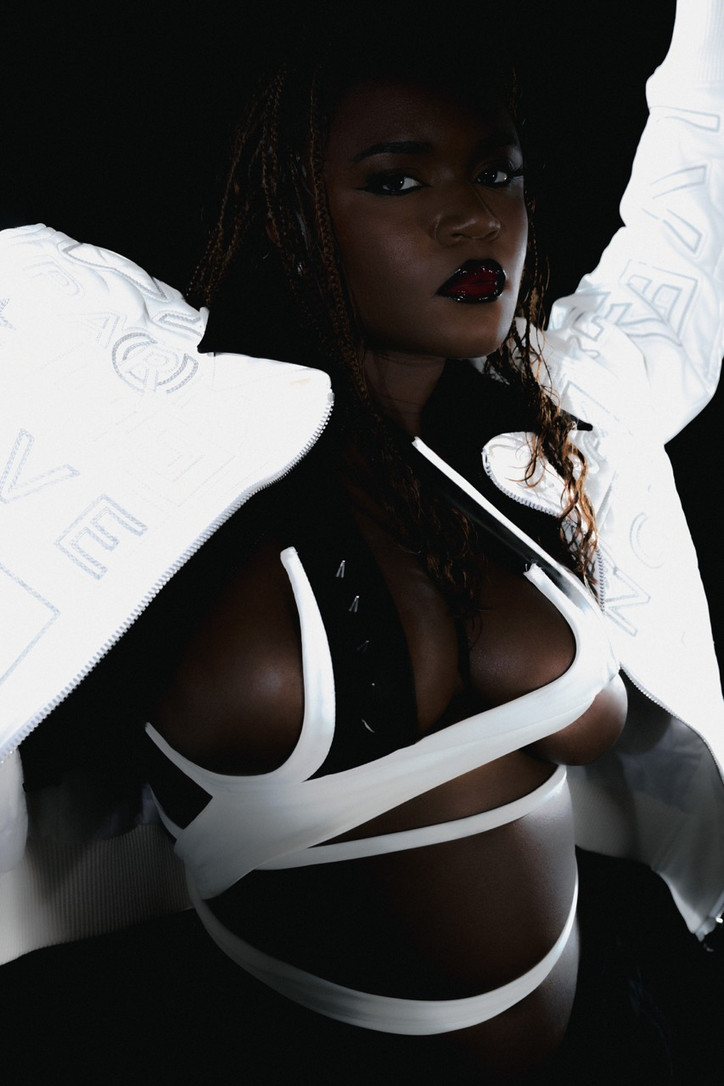
AMAARAE wears JACKET by GIVENCHY, CROPPED JACKET by DANZ, TOP by OTTOLINGER, PANTS by I.AM.GIA, BELT is STYLIST’S OWN
Unfortunately, people make catchy, fun songs synonymous with TikTok. Or view it as something that should only exist on the internet.
We’re always relegated to, “This is great for TikTok.” Like, it's okay for people to like songs.
You touched on a few musical artists who consumed your youth. Who are some inspirations that influence your craft and approach to music?
I love Stevie Nicks as a songwriter, instrumentalist, and vocalist. She is able to strike a real beauty between what can be edgy and unnerving but with great, soft, very thoughtful lyrics. I also like the Red Hot Chili Peppers. Anthony Kiedis is a great vocalist. I think Flea is a great bassist. And for me, what I like about them is their audacity at the time, and their ability to fuse so many different concepts from jazz to pop to rock and roll to heavy metal, death metal, and funk. The bass guitar is funk. I've talked to Flea before, and you realize he has a very deep knowledge of jazz and funk. He's applied that in their music. When I think about Janet and Michael Jackson — legendary entertainers that have done this for years — those are the people I look up to and care about, their art, and how they've navigated and built their careers.
Your inspirations speak to the genreless music that you create. When creating a track, are you someone who writes lyrics and then creates the production afterward, or vice versa?
For me, it's always production. I am more of a producer than I am an actual singer. Singing is a means to an end, so I can be involved in producing songs and records. It's creating the production and thinking of ideas and how far we can expand our production in a song. How can I apply all of my influences and roots in different ways, or in ways I've seen some of my predecessors apply them? Because I've found a distinct way to use my voice, I can experiment in many different genres because the vocals become the through line that connects all of these different sonic worlds.
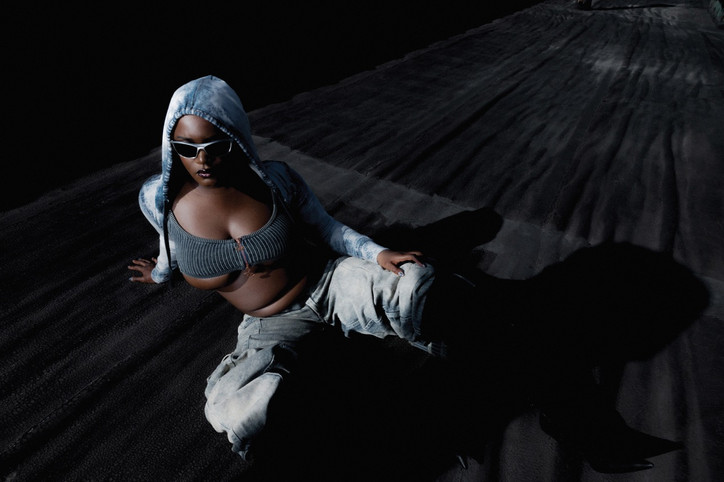
AMAARAE wears TOP, HOODIE, SHOES by DIESEL, PANTS by CLARA COLETTE MIRAMON, SUNGLASSES by OAKLEY
When you have the urge to write and pour bits of yourself on paper, what does that look like?
So many different songs have happened in different ways. I have a record on the album called “Sex, Violence, and Suicide,” and I was in my bedroom by myself, scrolling on Instagram, and I found a guitar loop on my friend's page. He was just freestyling on his guitar; I took the loop and started freestyling over it and wrote that song in five minutes versus a song like “Co-Star,” which people wouldn't guess was a really thoughtful record, in which we thought, “How can we make these lyrics fun, but also very witty?”
Then a record like “Disguise” is a cross-pollination of: what if Britney Spears did Afrobeats but then wrote great melodies, and even tapped into an artist like The Weeknd and how he would use his voice in certain ways. For me, songwriting comes in different ways, depending on the song, but what I care about every single time is writing very good lyrics. I always think if a fan is sitting and listening to the song, they should be able to pull up the lyrics on their phone while listening to the song and think to themselves, “Wow, these are really great lyrics,” or “This is a great melody, but what the fuck is she even talking about?” I pride myself on caring enough to be that detailed in the execution of the art.
And your pen game just continues to get stronger. With a track like “Co-Star,” each lyric is punchy yet playful, especially since the song is about astrology. What compelled you to write a song about signs?
I honestly didn’t start getting into astrology until I started coming to LA for work. The baseline for every conversation seemed to be, “What’s your sign?” When I wrote “Co-Star,” I didn't know much about star signs. I was just getting into it. I was having a conversation with my engineer. He said, “This girl I used to date told me to download this app called Co-star. You connect with your friends on it, and it tells you about your relationships with them and your day in detail.” A few days down the line, we were working on a song, and it was like, this would be a fire way to approach a song — writing about star signs. I don't think anyone right now has caught on to astrology being the main conversation piece of our generation. I actually read my horoscope every day. I read my family's horoscopes and my friends, but not in a way where people make it their whole personality.
What’s your favorite thing about being a Cancer?
People never have anything nice to say about Cancers. I've been gaslit to the point where I don't even know what I like about myself. I do know that we’re very emotionally intelligent and intuitive, which can also, if channeled the wrong way, be very manipulative. Fortunately, I'm one of the good Cancers. So I'm just intuitive.
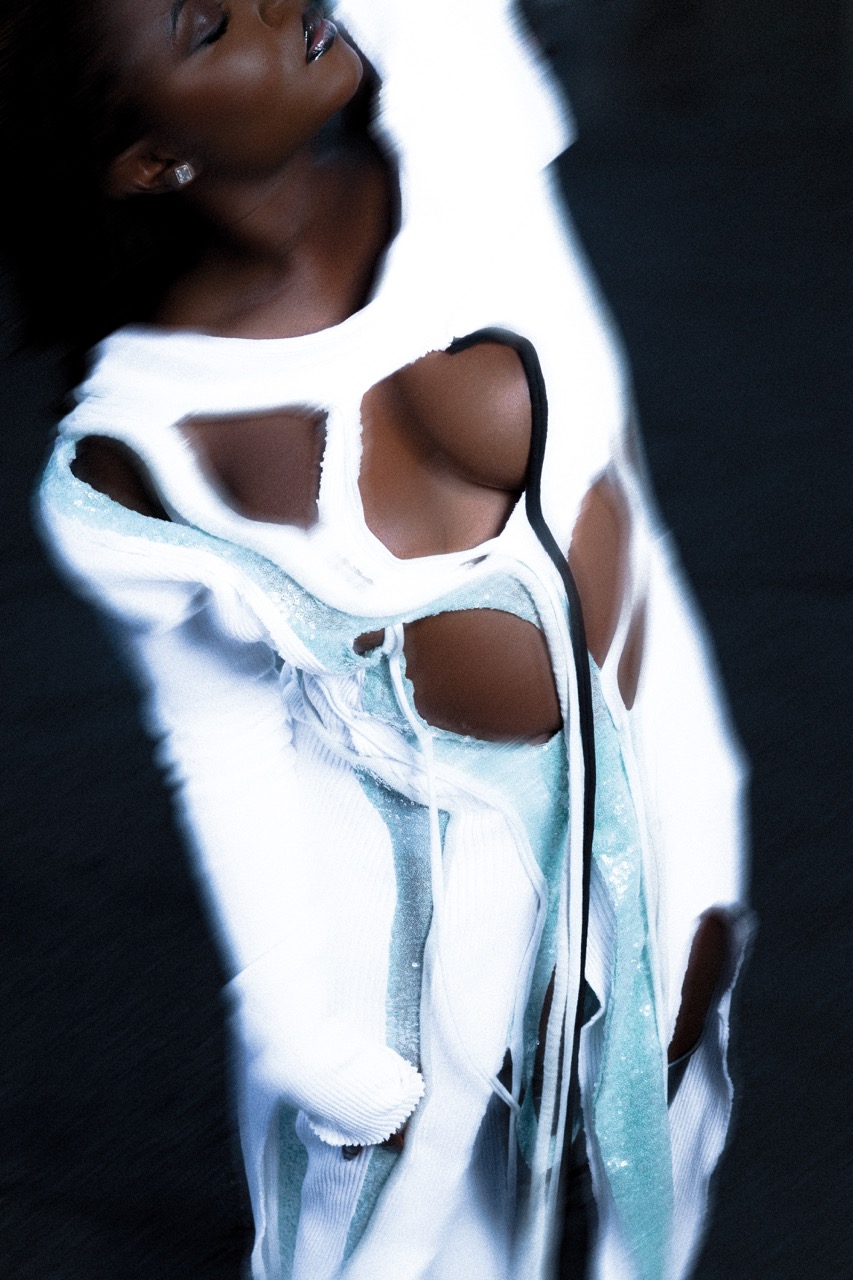
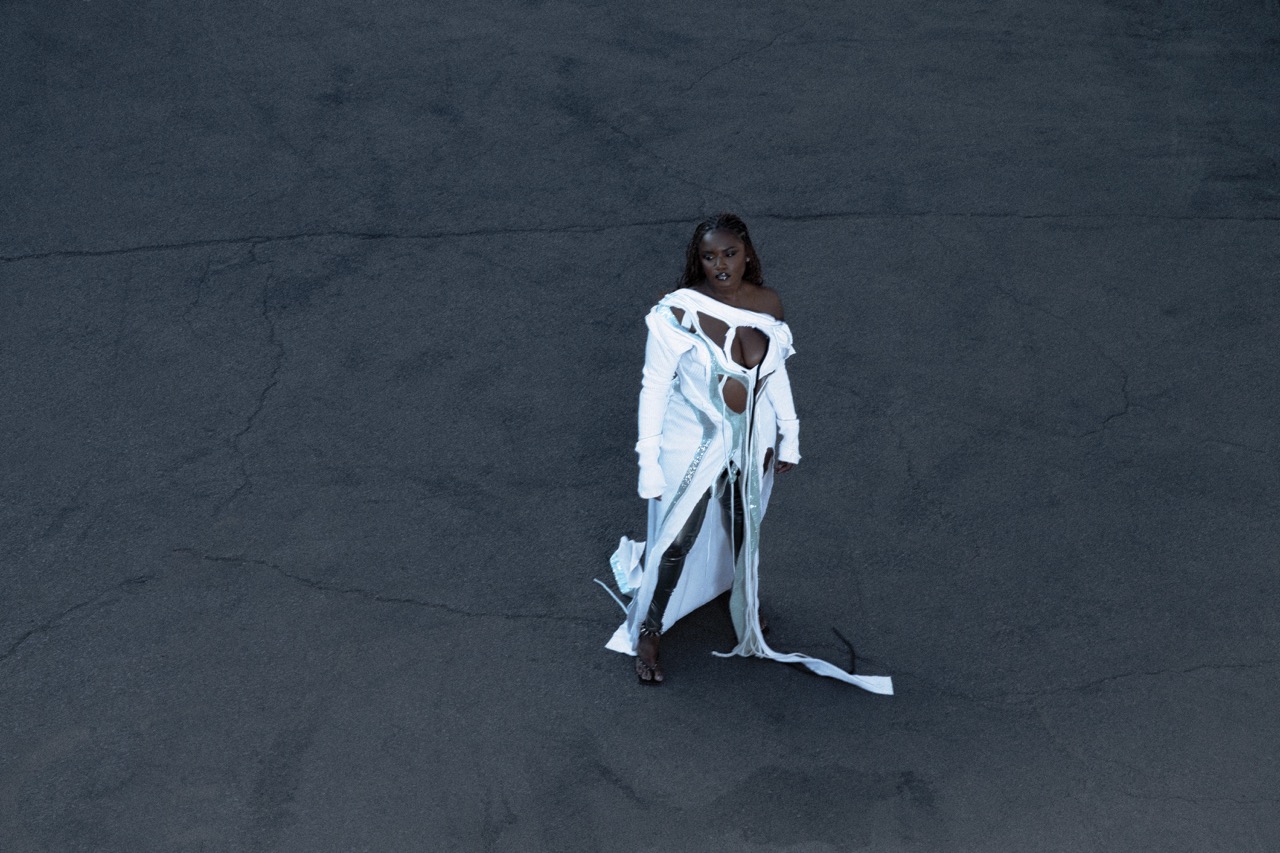
AMAARAE wears DRESS by OTTOLINGER, SHOES by FANCI CLUB, LEGGINGS are STYLIST’S OWN
Astrology is so prominent in America, and having friends from all different places, when you bring up astrological signs, is there culture shock?
No, honestly. The world is so interconnected because of the internet; something that started in LA in 2020 is now a conversation in places like Ghana. Now girls in Ghana want to ask what your sign is. It's become a universal topic. It's cool that people want to know more about themselves spiritually and are hungry to connect to the universe and the people around them.
You’ve been able to experience the rippling of culture growing up in so many different places. How has that influenced your craft, and what pieces from each place have you kept with you?
I've been doing that my entire life. I was born in New York, then lived in Ghana for my formative years, then moved to Atlanta. I lived there for about four years, moved to Jersey, moved back to Ghana, and moved back to Atlanta for college. It's cool because I've been in all these places, in different eras, in culture, and in music. I’ve been able to take all the things that I love about all these periods and these different cultures and apply them sonically.
I grew up in Atlanta at a time when Southern Hip-Hop was just bubbling and making its mark. What I remember most loving about Southern Hip-Hop is the drums and how dirty and aggressive the drums were. When we were making this album, I remember saying to my producers, “I want the drums to knock every single time in your face.” It was maybe a bit more subtle and softer with how we've approached it, but the influence is dirty Southern drums.
It was the same way when I grew up in Mount Olive, New Jersey. I was at a house party, and this girl named Alexa played Britney Spears’s “Blackout" from top to bottom the whole party. That was my first experience with Britney Spears’s “Blackout.” I didn't realize it, but it was a transformative time for me regarding how I saw music, how I even viewed Britney Spears, and what she was doing as an artist because it wasn't pop. It was trance and progressive house mixed with pop, but very dirty and nothing like anyone else at the time.
I've been in Ghana in so many different eras of development. Ghana had a SoundCloud era that was an underground African rap, but it was very cloudy and spacey rap. Most people don't know about that. That’s an element that I bring into my music. Traveling and being nomadic have allowed me to expand my reach and the way I think and create music.
Since you’ve been able to call various places home and continue to travel for work, how have you established and maintained a community?
That's where the internet comes into play. When I started going to Lagos, the way that I connected with a lot of artists was through SoundCloud DMss and also Instagram. The main thing was an artist in Lagos would post a song on SoundCloud, and their friends would repost it, and it'd somehow land on my SoundCloud feed. Then I’d DM the artist, “Yo, I love this song; let's work together.” That was a big initial community builder for me in Africa.
As far as the UK and America, being on Instagram and the internet, like being in the depths of the internet, where I might like a song and follow the engineer, and through the engineer, I find out he's a producer, and find out another producer that he likes, that works with another artist who has a dope sound. That's how I discovered Stacey Adams; she's an artist from Memphis, Tennessee. She’s a crazy rapper, one of my favorite rappers of all time right now. It's also how I discovered Bear1Boss, who's another Atlanta rapper. Having community and great spaces like SoundCloud is such a great place for artists to congregate, meet, and communicate.
Also, being inquisitive, being a researcher, and going down rabbit holes. Exploring things and people you like, following them, and shouting them out. And saying, “Hey, I'm in your city; let's meet up.”
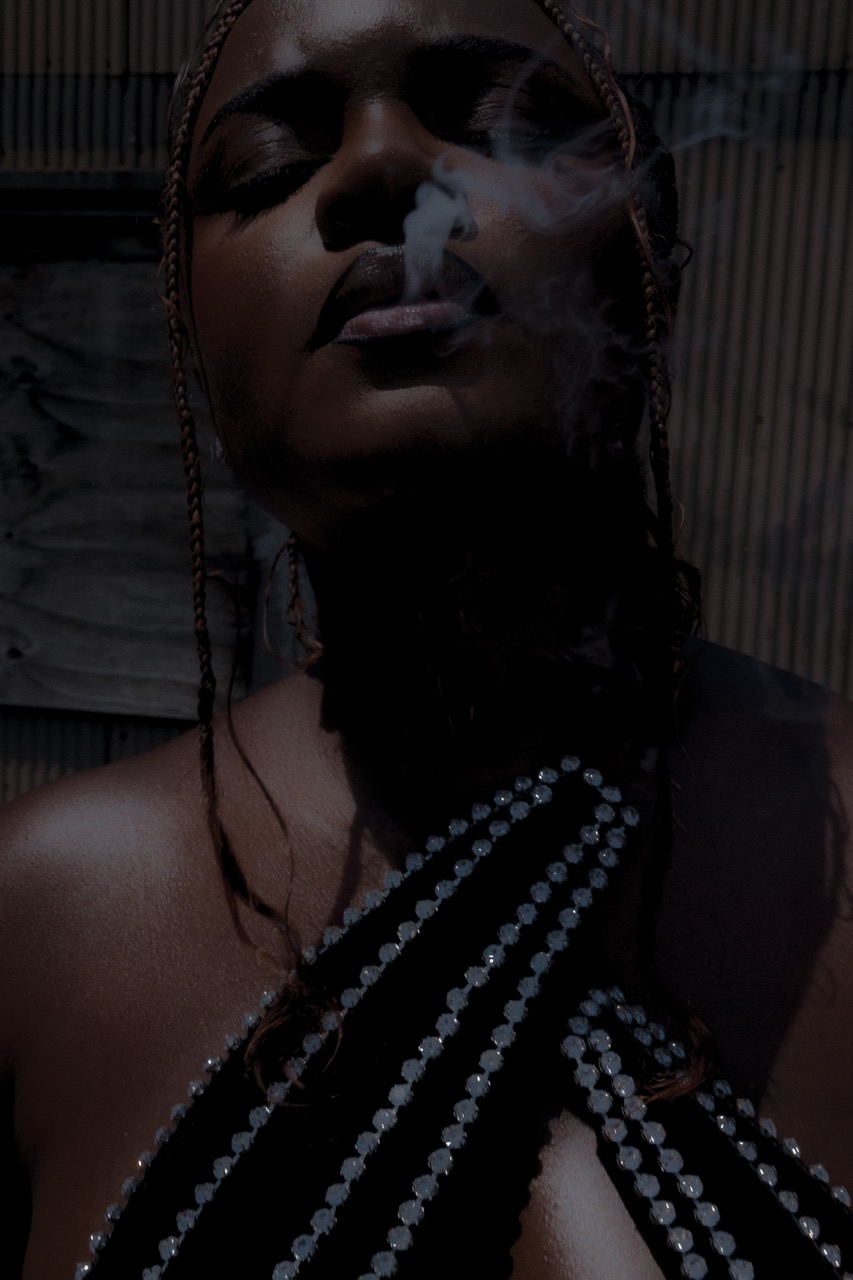
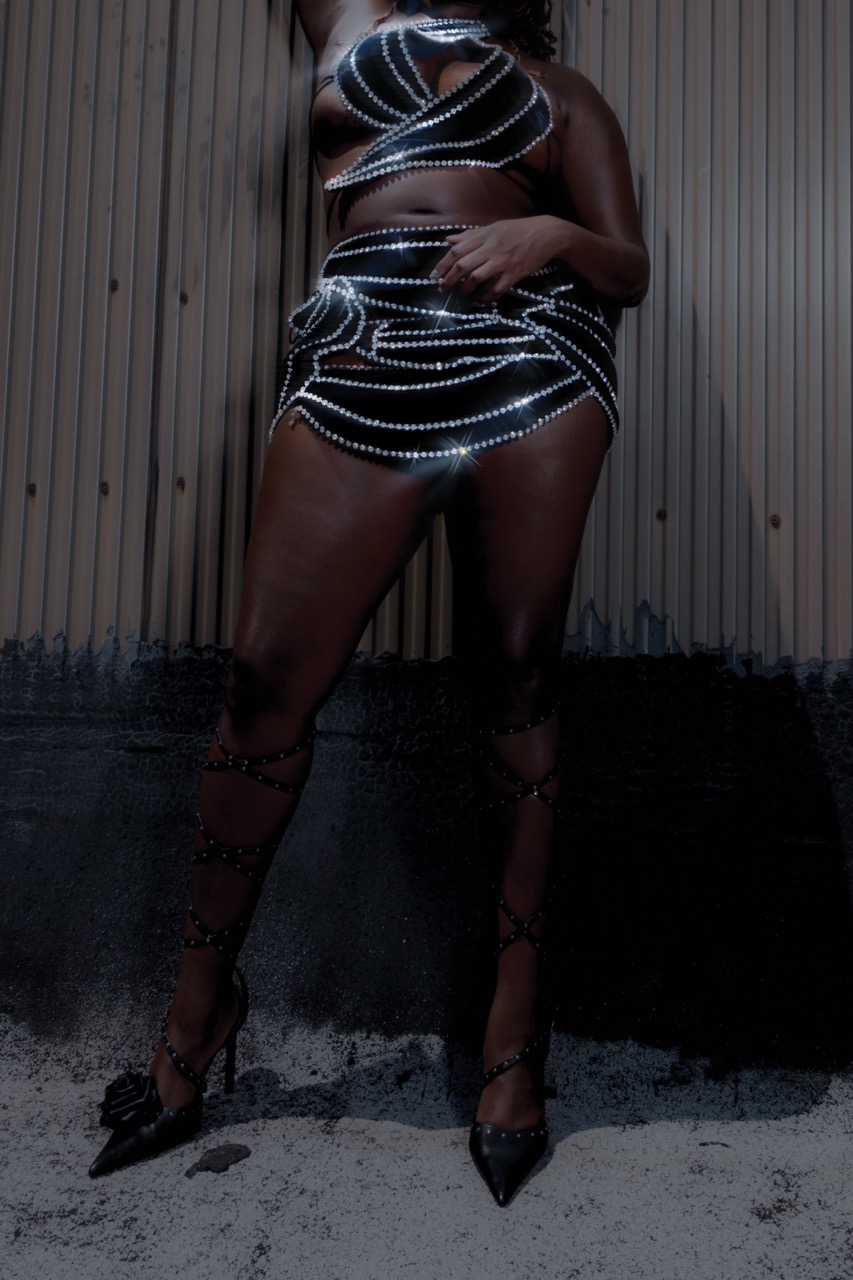
AMAARAE wears TOP, SKIRT by AREA, SHOES by FANCI CLUB
Out of your creative circle, who has supported you from the beginning and keeps supporting you?
My supporters have been some of the most unlikely people. This rapper who's huge in Ghana; his name is Medikal. He’s a local rapper and raps in the local dialect and Pidgin, and he’s the last person you would expect to like my music. He is somebody that championed me for years. Stone Boy is another Ghanaian artist who has championed me and always told me, “I think you're gonna be the first artist to bring a Grammy back home.” Also, people behind the scenes, Lawrence Burning. He used to write for The Fader and gave me so many exclusives. I remember he let me take over The Fader’s Instagram, which was a big one. Also, Amara who's a Nigerian director. She was also doing PR for a while and helped open a lot of doors for me. Kojey Radical, also my cousin, was one of the first people in England to champion and get behind me. There have been so many people that have supported me very early on.
Now, with your album, Fountain Baby, you’ll have even more supporters. Why that title?
What does a fountain do? It flows and flows and flows, and it never stops. I like to think of myself as a person who's a source of endless ideas, endless swag, endless everything, and endless blessings. It's a conscious and consistent flow state of abundance — an abundant child of God.
This album touches on many themes, from abundance to sexual fluidity, power, and spirituality, but it also possesses this sexiness to it.
I had a great muse when creating this album. They brought a lot of passion into my life, insight, and nurturing to the point where I felt so confident and Godly in my expression. I was getting that affirmation and expression of love and sexiness on a regular basis. It spilled out into the music, an understanding of how I was feeling and enjoying that feeling. I wanted to inject that into the music, not really as a calling card for people to approach me, but much more so as some type of indoctrination for people to feel that within themselves and then exude that onto others.
You represent that so beautifully and stylistically in your music videos. How do you use your music videos to further contextualize the themes and overall intention of a project?
The music videos I've done so far are a childhood dream come true. Once again, I've mentioned Janet Jackson so many times, and I'm sure she's tired. But honestly, my focal point is Janet. The way that she can express sexiness, unity, and love, but everything is so subtle and so soft and so sexy. And I think “Co-Star” has a bit of an edge. But what I wanted to come across was not too overexposed. Everything is very tasteful and very subtle, but it still hits hard. That was just me wanting to emulate Janet Jackson. “Reckless and Sweet” is a straight-up reference. I want to communicate community, love, and the subtleness of how to love in the sexiest way possible. My music videos are an homage to Janet.
As you continue to grow and evolve in your craft, are there moments where you think to yourself, “Should I keep going?”
Do I even want to keep going? This is the best question anyone has ever asked me in the entire universe. Man. When you look at the history of artists, the ones that give the most of themselves rarely ever feel reciprocation. Whether it be by fans, or the music industry itself, we're at a time now where the concept of art is very murky and muddled. Where social media used to be a tool to communicate and bypass the middleman and the execs who might have stalled the process, but I think social media has now forced people to become caricatures of what they initially wanted to represent. Are we artists who go into the studio, grind it out, make great records, and come up with great visuals? Or are we social media marketers? So the short answer to your question is, it's a daily struggle to want to keep going. because it's not an easy time in music. I find myself wanting to explore other creative options so that I can take a mental break and see where music goes. I just hope and pray that we come back to what truly matters, which is the art and artists that want to create and share with the world.
Although these thoughts swirl in your mind, your career continues to flourish, showing the world what Amaarae can accomplish. What would you say to your five-year-old self?
What would I say? What can I even say? Because I think I became what my five-year-old self wanted me to become. So maybe, “Keep believing in the shit that you think is fire because it's gonna pay off. Don't ever doubt it because it's gonna happen. A lot of people like to say shit can't happen, but not you. You're not one of them. So keep it pushing, baby.”
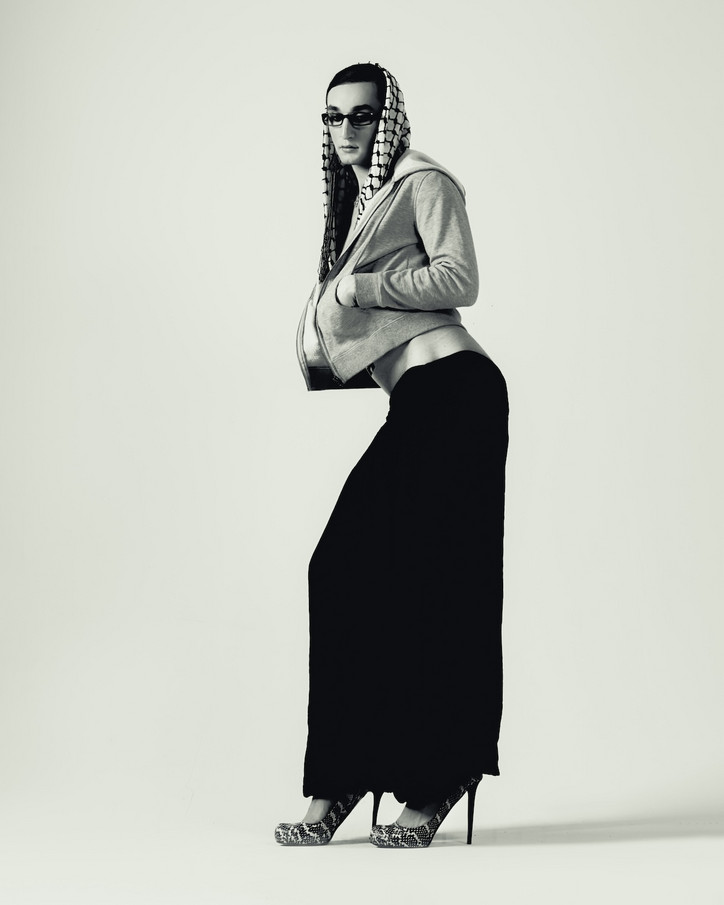
I’m so happy to see you. How are you?
Honestly I’m good. Life has been really nice recently. I think it’s turning 25. I don’t know. Something in the air’s different.
Aw that’s sweet. I so agree though, I turned 25 last March and something shifted. They say that your brain fully develops then. [Laughs]
Yeah, same. When we were younger, I was so excited and we were so stimulated by the rush of being at the club, by the people, the lights, the music, but it doesn’t excite me as much anymore. I really appreciate cuddling with my boo at home or even just having dinner with my friends. A lot of people get to that stage eventually, I just never thought it’d be me.
We really used to be in there. You’re still doing Hauterageous though right?
Yeah, of course.
How’s that going?
We just did a Boiler Room so that was really major. Starting it five years ago, I never expected to continue growing it in this way, but honestly, I always knew it was going to go somewhere because everything just fell into place. And of course it’s going to go somewhere because why not? Everything I touch turns into gold! That’s kind of the philosophy you need to embrace with these kinds of things, I guess.
I love that you’re still collaborating with a lot of the same girls.
A principle of mine that I carry in life is to bring whoever’s in my circle, whoever’s important to me into everything that I do. If you trust and love the people you're around, then it's only fair that they come up with you in any way you go, especially because whatever I do for them, they're going to do for me. Loyalty to your friends will take you really, really far. People like Syana, Ciggy, Mimi, Amal, my girl Miss Chris, these girls are my literal sisters and I believe in their talent so much. It’s not just that they’re my friends, but they're also extremely talented artists, and I want them to go wherever I go because I believe in their potential just as much as I do mine.
Does Montreal gatekeep?
It’s a lot less gatekeepy than bigger cities like New York or Toronto, and that's because I feel like there's no competitiveness for gigs because rent is cheap. Now it's increasing, rent is getting a lot more expensive, but because Montreal has always been known for affordable rent, people aren't fighting for gigs. People aren't dying to get to know the right people so that they can get in the right spot to be able to make money so that they can pay rent. Rent is kind of already covered, so people just rely on art to express themselves and they have the space to do that.
You definitely still have to work your way up just like any other artist and introduce yourself and put work towards your career, but there's a lot more space for you to grow in Montreal because the community here is so small, yet so big at the same time. Everybody knows each other, so once you get your foot in, you're kind of in the world already. One thing about having a really small community is that the love that people have for each other is so genuine, and that's one thing I see in Montreal that I don't see in any other city. No matter the scene you’re a part of, if you’re in the same community, people will have your back. That's really important to me and it’s why I love living here.
Yeah that makes sense, there’s so much more competition in New York. How has Hauterageous contributed to the growth of this community you find yourself in?
Hauterageous has introduced nightlife to so many young queer and trans people who watch what we do online. They come and it’s a place where a lot of people fall in love or make friends for the first time. People move here from other cities and go to Hauterageous and forge all these new connections. It’s really cool to watch it grow and see new and young people experience that side of nightlife. When I was that age, being in spaces like that was so important to me. It’s where I met people like you and I don’t know where I’d be without these kinds of spaces.
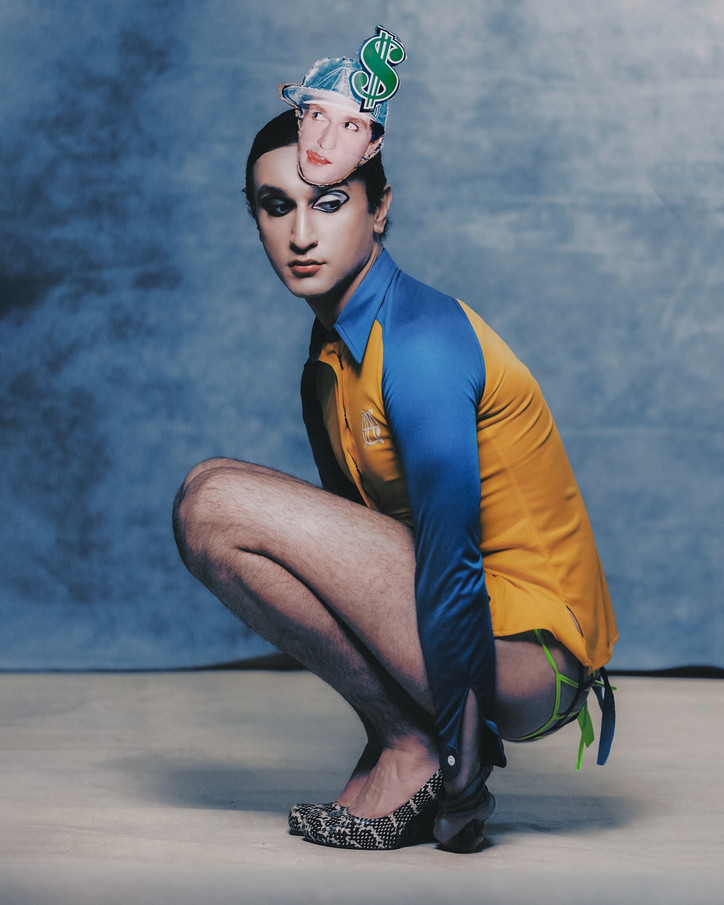
You just had a party on December 2nd right? How was that with everything going on in Palestine right now?
It’s definitely tough, I am Palestinian, a Queer Palestinian. I am constantly battling having to create safe spaces as my job, and realizing that there is no safe space for Palestinians right now. I have lost work during this time and continue to face adversity for literally just being where I'm from. Over twenty thousand of my people, killed in Gaza. My family watches as their home gets destroyed and all I can do is ‘share my knowledge and sign petitions’. Everything kind of just feels bleh at the moment. And what makes it worse, is that none of us have time to fucking grieve properly because capitalism is real and inflation is real and people are distracted by their need to survive, to make rent. I need to be able to pay rent and sadness is no currency. Hauterageous is somewhere I try to control that narrative. It is a space that symbolizes safety, understanding and liberation. It's doing something within my capacity and relies on the ripple effect of feel good, do good. That's all I can fundamentally impact. Regardless, what will always remain true and strong, is our plight to self-determination. It is evident that no matter what and how, we fight for a free Palestine. We, the Palestinian people, will not stop, until we are free. I am not free as a queer person until I am free as a Palestinian.
What does ‘raving for resistance’ mean to you?
Raving has always been a resistance movement. People create these kinds of spaces when they’ve been marginalized in society. It’s the one place you can go to let go, forget about your day problems and be with your community sharing love, dancing and escaping.
These are all really important things in a resistance movement because if people don’t have a space to recharge, they also won’t have enough energy to fight. Raves give you a space to recharge before you wake up in the morning and go to the protest. I know that sounds crazy, you’re going to be up until six in the morning at times, but you recharge mentally. When we say raves, we're not saying crazy EDM techno festivals where people just get blasted and drunk on Spring break.
I’m a Palestinian trans DJ, so these are the spaces where I can make an impact. Doing what I do and being who I am is important to me so that other people can see it and understand that there’s no monolith to being Palestinian.
Right, the War in Gaza is also impacting Palestinian people on a global scale.
Of course the journalists, doctors and people on the ground in Gaza deserve all our respect and efforts and it’s really important to highlight their voices, but on a local scale, people like myself are important to listen to because people need to understand that it’s also artists, DJs, music producers, dancers being affected by Zionism. This work is impactful to the resistance movement and those identities are important to remember and think about when it comes to resistance. It’s more about spreading the word because there’s only so much you can do from Canada. You're complicit in so many different ways, like our tax dollars fund the IDF, so if you think of it from a pragmatic perspective, there's not that much really that we can do. Rather than just sitting here and feeling guilty about what’s going on, you can try to change the narrative around Palestine by educating yourself and others.
Yeah, it’s sad to see that there’s still so much stigma around Palestinians, Muslim people and Arabs in the world, especially in the West.
Yeah, exactly. People love to throw around, How can you as a queer person support Palestine? If you go there, they’ll just shoot you, and it’s not true. That’s just an Islamophobic tactic to influence people’s perceptions of the Middle East.
As if the majority of America isn’t still deeply homophobic and transphobic.
Exactly, but people don’t give the same grace to Palestine or other Arab countries even though queer people have existed there for millenia.
Girl, they were throwing it back when Jesus was around.
No… like, on Jesus, darling. People don’t allow the same grace to the Middle East because the West wants something out of it. Educating yourself, others, talking to your friends, to colleagues, your family members, whether they agree with you or not, or are Islamophobic or Zionist, it’s doing something. There's a snowball effect to information and knowledge. Once somebody knows something and it’s passed on, it’s eventually going to get into the right hands to enact change.
Tell me about growing up in Qatar.
It was really interesting, I was surrounded by my people and culture and for that I’m forever grateful to have experienced because it has instilled so many beautiful values in me that I don’t see in the West. At the same time, I was always visibly queer, even as a kid, and this put me in really difficult and uncomfortable situations. I was heavily bullied at school, and still have to hide so many parts of myself from my family. I feel disposable to the people that helped shape me. My identity is all I have, truly. Something I think a lot of Arab queer kids relate to. This experience could have easily gone left if I held on to it differently, and sometimes it does. I am really strong and super smart and I’m grateful that this path shaped me into the person I’ve always wanted to be, but the sad reality of it all is that my strength and awareness are both survival tactics.
How does that inform your career in nightlife and the music that you make?
It informs everything. It's one of the only sources of true inspiration I have. I have connected with my inner child and learned to make it happy doing things I love. And what I love is making music and creating spaces for people to feel safe. I have learned to listen to myself and for that my trajectory is tangible. At the same time, my upbringing instilled the worst, most horrendous feelings of anxiety in me. I am constantly having to remind myself that I am worthy of love and friendships. Because I was once disposable to the people I love the most, I am now convinced I am a disposable person. As a result, in my adult life, it’s hard for me to trust and be vulnerable beyond what I've deemed comfortable. I have come to understand recently that I need to practice surrendering to the lack of control I actually have over these patterns, and channeling this energy into what I create is how I manage that kind of intrusive thinking. My upbringing is nightlife, is music, is love, is trust, is sadness, is art, is liberating. You can hear all this in my music, if you listen hard enough it's there. You can also see this at Hauterageous, my references are true and clear.
Are you coming out with anything soon?
I’m actually releasing another single with my girl Syana! It's being worked on as we speak and will be out on February 2nd.
Exciting!
Yeah. I have focused a lot of my time on learning how to produce better this year so hopefully you’ll get to see a bit of that in the next single. It’s called “Fuck”, featuring Syana.
I can’t wait to hear it.
Do you feel in alignment this year?
Yeah... I'd say so.
Why's that?
Because I worked for it! I’ve trained myself to listen to my gut, to understand that voice in my head that tells me what I should do and then know when to do it. If I need to cut a bad habit, I’m not afraid to do it anymore. And you know what changed it? There was a moment when me and my friends went to this techno festival called Best Out of Town, and we were all on shrooms, just having a good time, and there was a river with a bridge. We all climbed up and it was actually really high but we wanted to jump in the water. I was really afraid but in my head I was like, Okay girl. This is the life lesson that you're learning at this moment: you're really afraid, but if you do it, you're going to feel really good afterwards and if you stop yourself, you're just going to miss out.
Wow, very true too.
You never know what's on the other side. I jumped, and I was really happy about being in the water, about taking that step and being fearless. Once I got a glimpse of what being fearless feels like, I held onto it. Now, I try to apply it to every single thing that I do. In the past, there've been things I’ve wanted to do that I haven’t, but I’d convinced myself it wasn’t out of fear, being afraid of change.
Once you push through that fear everything opens up. I have a boyfriend now, I feel very happy with what I’m doing, I have a new job, I got a major collaboration with Hauterageous, but it’s also about doing the work for others, making sure you give back. Remind your friends how much you love them, support them when you can, because you can work on yourself as much as you want, but if you’re still a shit person to the people around you, then you aren’t going to get what you want because what you give is what you receive.
Has music helped you get there?
For sure. I mean, I've struggled with communicating with people my whole life. I was always a really weird kid. I got bullied most of my life. My school was one building of people from kindergarten until grade 12. It was nonstop, all the time so I learned to hold back from communicating who I truly am to people who thought I was too much or too weird or too quirky or too loud. Music has allowed me to communicate in a way that I wasn’t able to with words and I connect with my inner child the most when I produce music. That’s magical in my opinion.
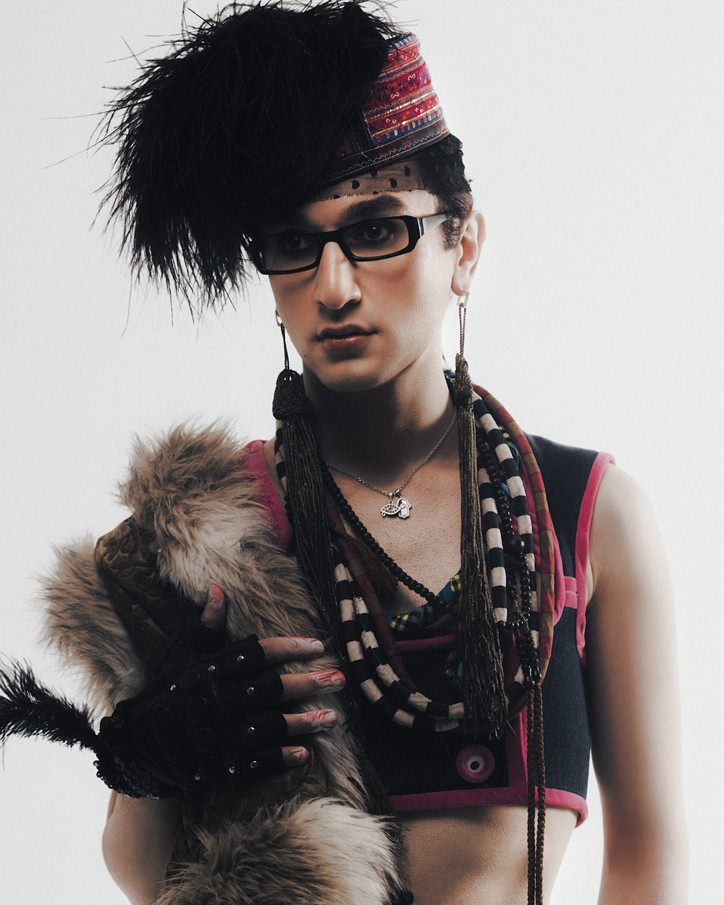
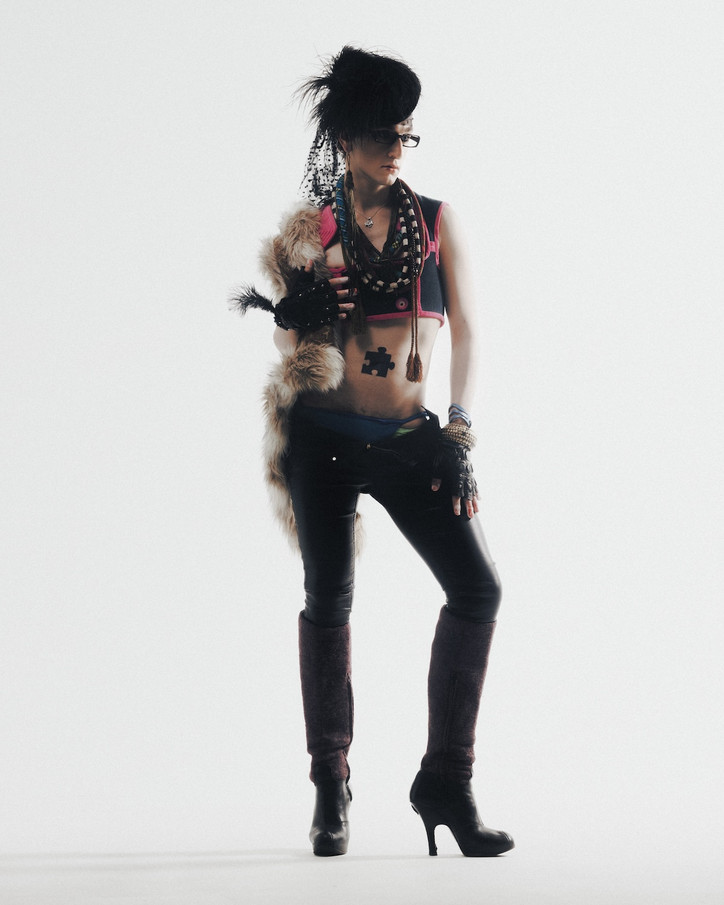
The fact that I’m here having grown up in Qatar with a strict Muslim upbringing, losing my dad at a very young age. I’ve faced so much and it’s really interesting to see how the dots are connecting.
Do you believe in fate?
Of course. I think that fate is just confirmation. Everybody that you interact with is, in some way or another, forever bound to you for the rest of your life. There’s a reason you meet the people that you do, because one day you’re going to come together to do something that’s going to evolve both of you, teach you a life lesson that you need to learn, or make you feel something you’ve never felt before. You never know what could happen.
Yeah, I also think it comes down to our choices.
Definitely, the way you’ve learned to choose things and what you choose influences the direction your life takes too. I mean, that’s listening to your gut.
What is your gut saying right now?
Time for dinner darling, she's hungry!
Oh same!
Seriously though, the thing about life is that we are given this free will to make decisions, but each decision that we make has its own reality, it has its own life that you’ll live from choosing to act on it. Your gut is the universe’s way of clueing you in. No matter who you talk to, everybody knows what’s right and wrong inside, it’s things like anxiety, depression, mental health, what you’ve learned, that influences your choices. Listening to that voice inside yourself so that fate can intervene is a really cool concept and it’s possible for everybody.
Do you feel like this internal sense of trust comes through in your work?
Yes, in a way. At first glance, I don't think my music gives you an in-depth perspective on someone like me. When you listen to my music at first, you think it's funny, kooky, DIY, loud. It’s more of a reflection of how I interject the cultures I’m around into my music. If you listen past the silliness, you’ll find true expression and intelligence. There are a lot of references that take time to gather. And once you see those things, that’s the message that I want to convey to the world. I want everybody to express themselves through their art, and to have good references, because being intentional in the art that you do is really important for where you want to go. I want to take myself where I'm headed.
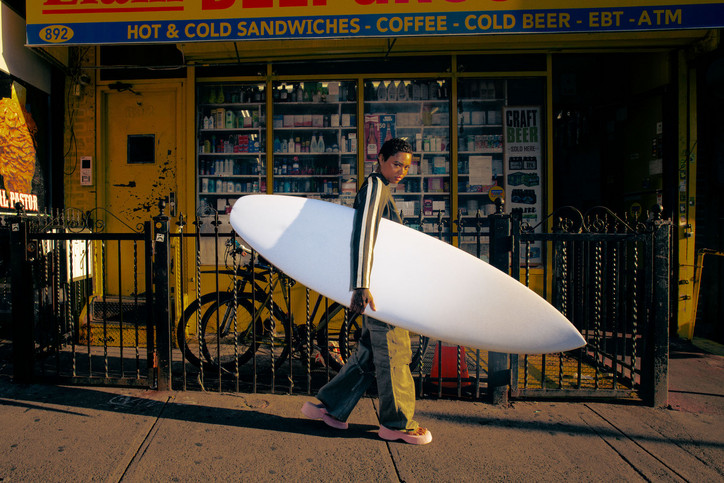
The singer-songwriter joined office to discuss her creative processes, the drain of overthinking, and why her most intense criticism is directed at herself. Read our conversation below.
Hi Samaria! Thank you so much for having this conversation with me. I'm really excited to be able to talk to another Bay Area native.
Hey! That’s sick, what part of the Bay?
Oakland, I grew up right by Lake Merritt. What part are you from?
I lived in Oakland, but I was mostly raised in Berkeley. My dad lived off High Street, but I always went to school in Berkeley because he didn't want me going to school in Oakland. I went to Berkeley High. I always try to correct that when people just say I'm from Oakland because I'm probably actually more from Berkeley.
I feel you. Technically I was born in Berkeley. I feel like everybody in the area was born at Alta Bates Hospital in Berkeley back then —
I was just about to ask, were you born at Alta Bates? That’s crazy. Small world, very small world.
Indeed! Can you tell me a little bit about the early days of your relationship with music? Did you know that you wanted to be a musician when you were a kid, or was that something that came along later?
Oh, 100%. I never really saw my life going any other way than me being an artist. Both of my parents were really influenced by music and both of them were chasing a music career when they were younger. My biological mom was a singer, and my dad was in a rap group with him and his cousins, all from Oakland too. He's like, a business, corporate man, basketball coach now, so those days are behind him.
But yeah, I was just grew up around a lot of neo-soul, and I was really influenced by Justin Timberlake's Justified album and Aaliyah when I was a kid. I just always wanted to be that person singing heartbreak records in the rain when I grew up.
I love it. What was your first tool or instrument? Was it singing first, or did you start off playing something?
It was actually singing and songwriting. I started writing really stupid songs in the sixth grade. That's around the time I started to realize I may have had a gift for it, because my cousins used to hype me and tell everybody that I was gonna be like a famous singer one day. They made me feel like I was really good at it, so I kept at it.
One of my first songs that I ever wrote was on this keyboard I had been gifted by my neighbor who was moving. On the old electric keyboards, you could press a button and it would just give you some kicks and like the most basic drum loop ever. I made a song about my sixth grade crush. From there, I was like, Yeah, I can do this.
Shoutout the sixth grade crush! Sparked something great.
And like, I recorded my very first song ever to like a Chip The Ripper instrumental. He's a super underground rapper and I got it off YouTube and a friend of my mom's used to come by the house to record her and just set up his equipment in the kitchen and any, and I have been begging me to let me record and I was like, I want to make a song, I want to make a song.
But they have finally let me make one. And like, that was like, when I realized that like, oh, like recording really isn't as crazy as I thought it was like, I thought you had to be in like a multimillion dollar studio. And once I realized that it's just as easy as having the right equipment and setting it up in any room and soundproofing it somehow I was like, Oh, yeah, it's up. It's up.
So I ended up making a SoundCloud account. I put out my very first song ever in my junior year of high school. I was 16. The song was called “Love Better.” I took it off SoundCloud a long time ago but I still have it in my email, and sometimes I go back to it and I'm like, Oh, I sound like a baby.
I mean, you were a baby in a lot of ways! We all gotta start somewhere. Do you write all of your own songs in full, or do you ever collaborate with other songwriters?
Everything that I’ve put out thus far has been all me lyrically. Within the past year and a half, I would say, I've started working with other artists with the pen. Normally it's just like me and a producer, but I started to feel like I was hitting a wall with my writing and I was like, You know what, maybe I should be open to working with others.
It's not that I ever turn my nose up at working with other people. I think that I had this block up, because everything I write is from such a personal place and I really treat my music like it's like my child. You know what I mean? Like, I don't always feel like other people can successfully relay the message that is coming from something that is so personal to me. It's kind of narrowed down for me who I actually feel comfortable allowing into that vulnerable space of mine, and I think that the people I have recently chosen to sit down and write with also share very similar experiences to me and also handled similar situations the same way that I would.
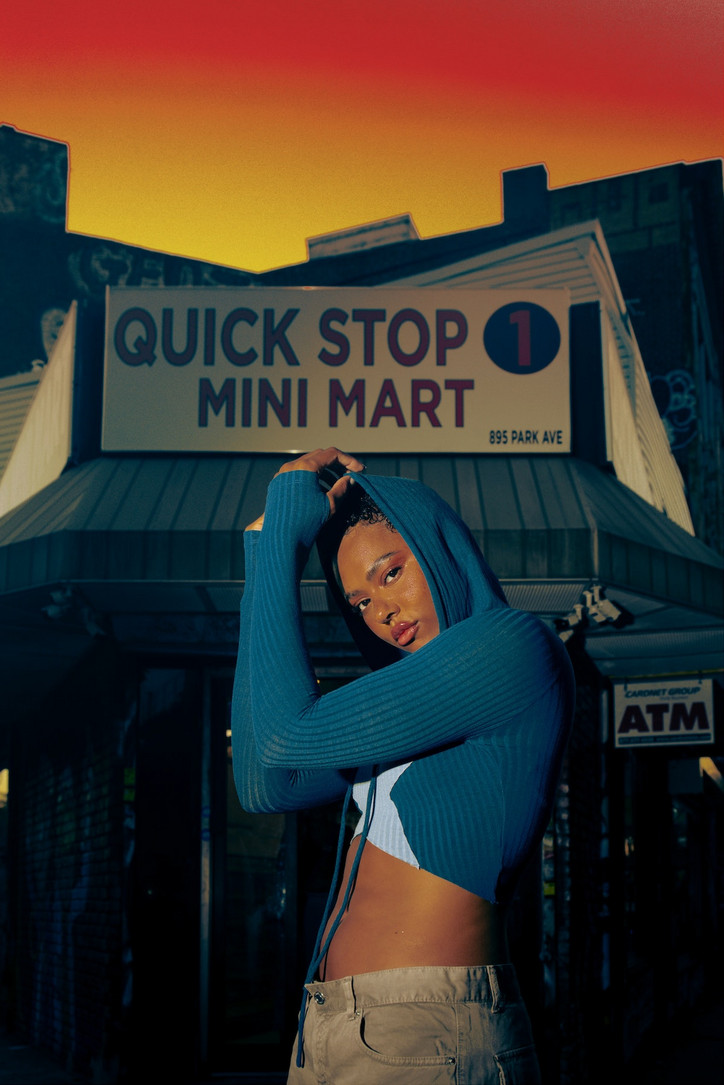
I’m also curious, when you write songs, do you write with melody first or lyrics first?
Usually the way I do it is I kind of freestyle, like a rapper. So there's definitely words involved when I'm doing top lines and stuff. And there will usually be something that I say within that where I'm like, oh, that's cool, and I'll run with that and build the song from there. Very, very rarely do I ever sit down and like, write a full song out and then go in the booth and record. I'll just go freestyle, pick something that I like and then just start rhyming from there off the top of my head.
It feels more authentic that way because you're not thinking too much about it. I hate thinking. When I feel like I'm starting to think too much about the songs that I'm writing, I always end up not liking what I make. I don't know what that's about. I've always been that way.
Is your writing always or mostly autobiographical? How much of it is based on your own experiences?
I throw myself under the bus in my songs more than I do anybody else. I will go in on myself. I've noticed that, like, the last few people to write about me use the words “self reflective,” and I think that's putting it nicely. I really have a habit of tearing myself apart in my music. It's not always in a negative way — even with this project that I'm getting ready to release, it's like taking a look inside myself and picking myself apart in order to be able to do better.
Speaking of the project, I was able to listen to it ahead of time. It's beautiful. Congratulations. From your ep last year to now, did it feel different in any way, both in the process of creating it and also now in the process of building up to the release?
That's a good question. With every project that I release, there's always growth, of course. But I'm learning now, listening back, each project displays a different type of growth within my life.
The last one — I was going through a really bad breakup, and I think that the songs on that for the most part were really geared towards getting over that person, that one individual, and getting myself through that breakup.
Now I've kind of stepped back from the situation and looked at it from angles that I hadn't before. and like I said earlier, like, just really tearing myself apart as opposed to the situation itself and dissecting myself in the way that I chose to handle things in the past. Not even just in that relationship, but just in my life.
I love that. Final question: is there a song or an aspect of this project that you are the most excited or the most proud of for people to hear?
Yeah! I kind of stopped listening to the project for a while because I wanted it to feel new to me again when it came out, so I gave my ears a break. But I listened to it again the other day, just out of excitement because the release is approaching quickly. One of the songs that wasn't necessarily a favorite of mine just became a favorite of mine. It's called “Three Rings.”
There’s a movie I watched called Good Luck Chuck, about a guy who, I think he gets cursed as a young boy and the woman who cursed him pretty much made it so that every woman who sleeps with him will end up marrying the person that they sleep with him.
So women realize that he's this good luck charm to getting an engagement ring. At first he's like, “Oh this is great, all these girls want to sleep with me.” But then after a while, he becomes lonely because nobody actually wants to be with him. He ends up meeting this girl that he just absolutely falls in love with, but he doesn’t want to sleep with her because he doesn't want to lose her to someone.
Many times in my life when I end up dating somebody, I’ve felt like they always end up finding their forever person after me. So I wrote this song called “Three Rings.” And in the song, I say “that's Three Rings given to someone who should be me.”
And like, I never realized how deep that song hit for me until I just listened back to it a couple of days ago and the lyrics just started hitting me differently. So, yeah, “Three Rings” would probably be my favorite right now.
